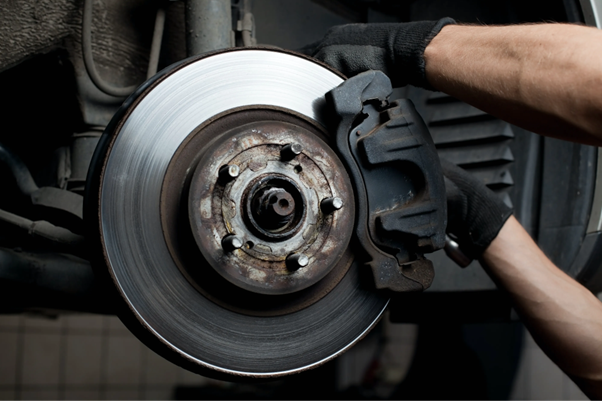The fix for vibrating brakes

Feeling vibration on your car as you press on the brake pedals is not normal.It is not only inconvenient but also a potential safety concern. To ensure passenger comfort and road safety, it is crucial to diagnose and address brake vibration promptly.
Commission Causes of Brake Vibration
Warped or Damaged Rotors
The metal discs known as rotors are essential components that the brake pads press against to slow down your vehicle. When the rotors become warped or damaged due to excessive heat or wear, they can lead to brake vibration. This issue is particularly common in situations where the brakes have been subjected to continuous heavy braking or aggressive driving.
Worn or Uneven Brake Pads
Brake pads naturally undergo wear and tear with regular use. Neglecting to replace them when they wear down can result in vibrations during braking. Additionally, even if the pads are not entirely worn out, uneven wear can still cause vibrations.
Air in the Brake Lines
Brake lines are responsible for carrying brake fluid from the master cylinder to the brake calipers. The presence of air in the brake lines can lead to a spongy brake pedal and cause vibrations during braking. This can occur due to improper bleeding of the brake system or leaks.
Sticking Calipers
The brake calipers play a crucial role in applying and releasing pressure on the brake pads against the rotors. If the calipers fail to release properly, it can cause uneven braking and vibrations. This issue is often a result of caliper slide pins becoming corroded or caliper pistons sticking.
How to Fix a Vibrating Brake
Schedule a Brake Inspection
When you encounter brake vibration, the first step is to schedule a brake inspection with a qualified technician. A professional evaluation will determine the specific cause of the vibration. In some cases, a simple solution like replacing worn brake pads may be sufficient. However, for more serious issues like warped rotors or sticking calipers, the technician can recommend appropriate repairs.
Rotor Resurfacing or Replacement
If the rotors are warped or damaged, the technician may suggest resurfacing them if they meet the required thickness specifications. Resurfacing smooths out minor imperfections, allowing the brake pads to make proper contact. However, severely warped or worn rotors may require replacement.
Brake Pad Replacement
Worn or uneven brake pads should be replaced promptly. High-quality brake pads designed for your specific vehicle are essential to ensure optimal performance and reduce the likelihood of future brake vibration.
Brake System Bleeding
If air is present in the brake lines, bleeding the brake system is necessary to remove air pockets and restore proper brake pedal feel.
How to Prevent Brake Vibrations
Regular Maintenance
Schedule regular maintenance tune-ups that include brake inspections. Identifying potential issues early on can prevent excessive wear and minimize the risk of brake vibration.
Brake Smoothly
Avoid aggressive or sudden braking whenever possible, as it generates excessive heat and can contribute to rotor warping.
Use High-Quality Components
Invest in high-quality brake pads and rotors specifically designed for your vehicle's specifications. High-grade components provide better performance and longevity, reducing the likelihood of brake vibration.
The moment you feel that uncomfortable vibration, the next step you should take is to diagnose the problem and fix it. This ensures you are always safe when you’re on the road.